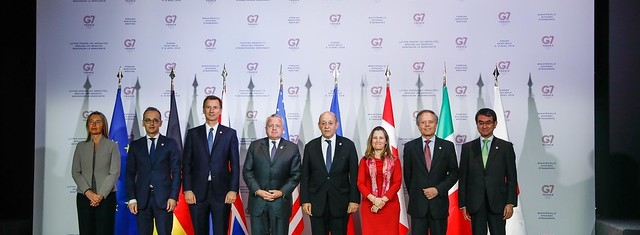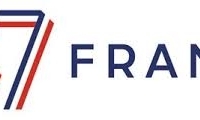Politics
JOINT G7 COMMUNIQUE OF THE 7 EDUCATION MINSITERS & INTERNATIONAL DEVELEOPEMENT
TACKLING INEQUALITY THROUGH GENDER ISSUE

G7 Minsiters of Foreign Affairs Paris (Source: French Ministry of Foreign Affairs)
USPA NEWS -
The G7 Ministers of Education and International Development have signed a Joint communiqué on Tackling inequality in developing countries through gender-responsive education and quality Technical and vocational education and training. Here is the full text of the Joint statement prepared ahead of the G7 to be held 24-26 August in Biarritz, under the Presidency of farce this year 2019.
JOINT STATEMENT TACKLING INEQUALITY IN DEVELOPING COUNTRIES THROUGH GENDER- RESPONSIVE EDUCATION AND QUALITY TECHNICAL AND VOCATIONAL EDUCATION & TRAINING:------------------------------
1. We, G7, met in Paris on 5 July 2019 to assert our vision that education is a human right and a key driver for sustainable development. In line with its previous work and declarations, the G7 aims at addressing inequalities in education in developing countries, particularly in sub-Saharan Africa and the Sahel, which continue to face the greatest gaps and challenges in education, through collaborative, sustainable and gender-responsive education policies------------------------------
2. Inclusive and equitable quality education, lifelong learning and training opportunities for all, higher education and research, are key drivers to advance the UN 2030 Agenda. We support the recommendations made by the Education 2030 Steering Committee to the United Nations High-Level Political Forum and welcome the opportunity to undertake an in-depth review of SDG4. According to the Global Sustainable Development Report 2019, trends are positive regarding education, but progress is too slow to meet the target in 2030, especially for early childhood development and post-primary education. In this context, we will strive to increase efforts to address education sector financing gaps for basic education, through our development financing and through dialogue on domestic financing with partner countries, targeting populations in situations of vulnerability, including those facing crisis contexts and protracted conflict. In line with G7 efforts, we welcome G20 leaders´ commitment to education as emphasized in the G20 Osaka Leaders´ Declaration and the adoption of the G20 Initiative on Human Capital Investment for Sustainable Development.-------------------------------------------------------------------
3. We endeavour to work together with developing countries to promote inclusion, equity and quality education for all, particularly girls and women, and to tackle core challenges faced by their education systems, by: strengthening the governance of education systems; recruiting, training and upskilling teachers; striving to help support decent working conditions; and fostering individual continuous professional development. Alongside the international community, including civil society organizations and the private sector, we are committed to addressing these priorities with concrete actions for tangible results, especially in the least developed countries.--------------------------------------------------------------------------------
4. We value the involvement of young people in developing countries in issues that concern them first and foremost. We invite them to become active participants in and advocates for their education and future. We welcome the youth consultation held ahead of the G7 Joint Education and International Development Ministerial Meeting on 5 July 2019, which enriched our discussions on education priorities in sub-Saharan Africa.--------------------------------------------------------------------------------
5. We are strongly committed to addressing and eliminating gender biases, inequality, stereotypes and gender discrimination. Far too many girls around the world, especially in the context of crises, continue to face barriers related to poverty, deep-rooted gender discrimination; school related gender-based violence including sexual violence, child, early and forced marriage, child and early pregnancy, and restrictive social norms and attitudes. Additional obstacles arise in school contexts, such as inadequate facilities or gender-biased curricula. We, as G7 Members, are already engaged in supporting development and implementation of various programmes and projects in developing countries to support girls´ access to quality, inclusive and gender-responsive education, mentoring, teacher training and socio-professional inclusion. We strive to better 2 July 5th 2019 coordinate our actions, to innovate and to continue advocating for improvements. In this respect, we welcome the G7-UNESCO International Conference on Innovation for girls and women´s empowerment through education on 5 July 2019.
6. We intend to take stock of, reaffirm and make new actions in developing countries to support positive results for all girls by:
ï‚· Continue to support 12 years of quality education for all children with a focus on the hardest to reach girls, including girls in situations of conflict, crisis and fragility, rural girls, married girls, and girls with disabilities;
ï‚· Promoting gender-responsiveness in education systems and encouraging partner countries, where necessary and appropriate, to work in a more coordinated and streamlined manner within the education sector to address the barriers girls face, to incorporate gender-responsive education policies into planning, budgeting, implementing, monitoring and reporting, and to promote transformative approaches of teaching and learning within curricula and learning materials;
ï‚· Promoting and protecting adolescent health and well-being through evidence-based health care and health information learning and ending discriminatory policies and practices of excluding pregnant or married girls from schools;
ï‚· Championing the agenda to end violence in schools and other educational and learning institutions to ensure girls´ safety in and on the way to school creating safe learning environments and encouraging existing global initiatives in this field;
ï‚· Promoting stronger transformational education institutions and a vision of empowered women and youth, while developing and supporting qualified female teachers in the classroom and in leadership positions;-----------------------------------------------
ï‚· Pushing for better sex-disaggregated data and sharing of knowledge and experience around educational programmes and policies that support the empowerment of girls and women;-------------------------------------------------------------------------------
ï‚· Adopting the “Gender at the Centre“ initiative (see APPENDIX) to foster renewed efforts to promote gender-responsive education sector planning.
7. With a view to increasing the empowerment and employability of individuals, especially women and young people, while stimulating countries´ and businesses´ ability to innovate, create jobs and drive change for greater social and economic inclusion, we commit to continuing our efforts to support partner developing countries in technical and vocational education and training (TVET). We agree that TVET must be based simultaneously on labour-market needs, professional skills development for employability, flexibility in the training offered, including in the informal economy and in apprenticeships, and the empowerment of populations in situations of vulnerability. We look to pursue the following objectives with partners in developing countries:
ï‚· Supporting TVET systems attractively, innovatively and efficiently, making them better adapted to labour market opportunities and the challenges of digital transformations;
ï‚· Providing young people and adults, especially women, with valuable transferable skills which maximize their productive capabilities, fostering their empowerment, inclusion and economic integration;
ï‚· In reference with the G7 commitment in Elmau increasing by one third until 2030 the share of women who can access TVET; special attention should be paid to supporting women´s participation in the science, technology, engineering, and mathematics (STEM) sector and other high-paying male-dominated sectors;
ï‚· Providing technical and financial support to partner countries for the development of their TVET;
ï‚· Advocating for better coordination of TVET activities among all relevant stakeholders within developing countries, in partnership with the private sector;
ï‚· Adopting the Charter of Commitments on TVET (see APPENDIX).
8. Recognizing the significant and persistent challenges facing education in sub-Saharan Africa and in Sahel countries, particularly for girls, we have engaged in dialogue with Education Ministers from G5 Sahel countries and Senegal on education issues and challenges in the region as well as on their efforts to address these, including in contexts where it is difficult to maintain essential public services such as education in conflict-affected areas. As G7 members, we intend to:
ï‚· Reinforce the coordination and dialogue between our development and education ministries, where appropriate, with G5 Sahel countries ministries of education and/or relevant governmental institutions for TVET whenever possible, to support removal of discriminatory barriers, improve access to quality and inclusive education, and share best practices;
ï‚· Step up coordination at country level of G7 donor representatives, including in the framework of the Sahel Alliance;
ï‚· Calling for more effective coordination of multilateral players, international financial institutions and international organizations such as UNESCO, the World Bank, the Global Partnership for Education, Education Cannot Wait, the United Nations Children´s Fund and the International Labour Organization, particularly in their efforts to improve the quality and coverage of inclusive education, in the Sahel and its conflict-affected areas;------------------------------------------------------------
ï‚· Strengthening resilience in Sahel countries by encouraging partner countries governments and other donors to join a collective effort in strengthening education systems, and thus increasing political and financial support to education, including basic education, and TVET;---------------------------------------------------------------------------------------------------------
ï‚· Working to significantly increase the number of qualified teachers in Sahel countries; ï‚· Ensure our cooperation with the Sahel reflects all the principles and commitments outlined in this communique, especially with regard to the empowerment of girls and women through and in education.----------------------------------------------------------------------------------------------------------
9. As G7 members, meeting for the first time in this joint format of G7 International Development and Education Ministers, we stress the importance of working in the aforementioned priority areas to help ensure that all children and young people in developing countries are given the same opportunities to enjoy their rights and potential and to build the sustainable future we all need, through high quality and inclusive education and TVET as well as lifelong learning for all. Source : G7, French Ministry of Foreign Affairs
Liability for this article lies with the author, who also holds the copyright. Editorial content from USPA may be quoted on other websites as long as the quote comprises no more than 5% of the entire text, is marked as such and the source is named (via hyperlink).








